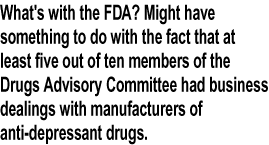 The Neurotransmitter "Serotonin" & Serotonin Acting Anti-depressants
The Neurotransmitter "Serotonin" & Serotonin Acting Anti-depressants
Since 1988 the pharmaceutical companies (starting with Eli Lilly, the
manufacturer of "Prozac") have advertised to the people (direct to consumer) as well as to their family doctors,
that if you suffer from depressive feelings, you must have a "biochemical imbalance" in your
brain. The advertising finger was pointed at the neurotransmitter "serotonin", and it is
used to explain nearly any emotional problem a person might have nowadays. Many other
pharmaceutical companies came out with so many variants on the SSRI-antidepressant to try and capitalize on
its popularity, by spreading this theory even further amongst the people. Theory? Yes, only a theory!
The Truth is that nobody in the medical field really knows if a
"biochemical
imbalance"
is the cause of any mental disorder, and they do not know how even the hypothesized "biochemical imbalances" could
produce the emotional, cognitive, and behavioural symptoms that characterize any mental disorder. Clever marketing
tactics exercised on us by the pharmaceutical industry, prevailed above scientifical evidence and research.
Greed, dis-respect and contempt of the population, prevailed above altruism, medical care and responsibility.
It's the greatest shame of of this era.
More information:
Primary care doctors prescribe SSRI-antidepressants to millions of adults, adolescents and children, certainly not only for treatment of depression anymore. SSRI's are prescribed for school phobias, bed wetting, eating disorders, sleep disturbances (insomnia), nail biting, hair pulling, headache, gambling addiction, alcohol addiction, back pain, stomach upset, premenstrual syndrome, etc., and even to "feel better then well". SSRI's have become all purpose "feel good pills", nowadays, in the year 2000. Unfortunately many doctors are unaware of the major
consequences and some of
them don't even seem to
care. They argue that the positive effects of SSRI's far outweigh their negative effects. Nothing could be further from the truth.
SSRI's may not be compared with regular medications, like insulin to treat diabetics. SSRI's are psychoactive, blood-brain barrier passing drugs and interact with the serotonergic system in the brain. Another example of drugs interacting with the serotonergic system are LSD and
Ecstasy
(MDMA). The serotonergic system is responsible for "how we perceive, experience and feel the inside and outside world". YOU and only YOU created the neuropaths of this serotonergic system through the years by learning new things over and over again. And so it represents YOUR serotonergic system with it's own unique structure, playing a big role in the composition of YOUR mind, YOUR consciousness, YOUR emotions, YOUR thoughts. When these serotonergic brain cells are artificially pushed (by SSRI's) to act beyond their capacity or boundaries, this can result in the most disastrous serious adverse reactions. People need to be informed about the risks especially when children are involved.
 Serotonin Re-Uptake Inhibitor = Impairing Body Serotonin Metabolism
Serotonin Re-Uptake Inhibitor = Impairing Body Serotonin Metabolism
SSRI's are "Selective Serotonin Re-Uptake Inhibitors." Neuronal re-uptake of neurotransmitters is metabolism.
What serotonin re-uptake inhibitor actually means is that the SSRI-antidepressant interferes with ones ability to metabolise serotonin, so that will build up. In other words, an SSRI-antidepressant impairs the ability of cells to metabolise serotonin, not only in the brain, but -since serotonin is widely distributed throughout the body- in the body as well! The greatest concentration of serotonin, around 90%, is not found in the brain, but is found in the gastrointestinal or digestive tract (human gut, intestines, bowels).
Originally, the neurotransmitter serotonin -thought to be secreted by the Pineal Gland- is called a neurohormone, because of it's
specific regulatory effect on the activity of the Endocrine Glands in the human body. (1),(2)
Affecting serotonin means affecting the Glandular Endocrine System. Next to it, serotonin
affects the Cardiovascular System and the Respiratory System, under which, the lungs.
Serotonin is also found in blood platelets and stimulates platelet aggregation (blood clotting). Furthermore, serotonin is known to affect contraction of smooth muscles (such as those of the gut) and blood vessel elasticity (vasoconstriction and expansion).
More information:
 Fraudulent Clinical Trials and the FDA
Fraudulent Clinical Trials and the FDA
Many primary care doctors and most people believe, that SSRI's have undergone independent tests controlled by the Food and Drug Administration (FDA) to insure safety. In fact the FDA does not "test" proposed new drugs. It relies almost exclusively on safety and efficacy data provided by the drug's sponsor. SSRI studies are constructed, financed, and supervised entirely by pharmaceutical companies themselves. The testing process is deeply flawed. The clinical tests of antidepressants (SSRI's) are remarkably short. Although the FDA's guidelines for large-scale clinical tests recommend they last at least 6 weeks, in some instances studies as short as 4 weeks are accepted. Typically, the studies last 6 to 8 weeks!

And how about the US Food and Drug Administration (FDA)? Already in 1993, 28,623 reports of adverse reactions to "Prozac" -the Eli Lilly SSRI, approved for the market since 1988- had been received by the FDA. These included effects such as delirium, hallucinations, convulsions, violent hostility, aggression, psychosis, 1,885 suicide attempts and 1,734 deaths - 1,089 by suicide. However, this didn't seem to be enough to provoke the FDA to act against the SSRI manufacturer. As a major consequence from this lack of action, other pharmaceutical companies were permitted to follow Eli Lilly's example, resulting in more Prozac copy-cat SSRI's like Paxil, Zoloft, Celexa, etc., nowadays, and probably more to come in the near future. How many reports of adverse reactions to these SSRI's must the FDA receive to pull them from the market? Or has this already gone too far?
 Personality Structure and Out of Character Behaviour
Personality Structure and Out of Character Behaviour
We now have legal psychoactive, blood-brain barrier passing drugs, acting on the serotonergic system (SSRI's), the dopaminergic system (SDRI's) and the nor-adrenergic system (SNRI's) in the brain. The neurotransmitters dopamine, epinephrine (adrenalin) and nor-epinephrine (nor-adrenalin) are called "catecholamines" and control the adrenergic systems in the central nervous system (CNS). They account for staying awake, mood, fight or flight response, etc.. Serotonin is the primary inhibitory neurotransmitter modulating the excitatory catecholamine systems in the CNS. Serotonin neurons control memory, mood, sex drive, etc.. Serotonin, dopamine and nor-epinephrine (nor-adrenalin) are the key-neurotransmitters involved with the construction of YOUR personality structure, as stated by doctor C. Robert
Cloninger. Every drug that acts on the serotonergic system will affect (indirectly) the other neurotransmitter systems (dopaminergic, nor-adrenergic) in the brain (and visa-versa), thereby affecting YOUR personality structure, YOUR temperament, YOUR character.
This must be exactly what happened to the antidepressant influenced home, school- and workplace shooters/killers who have reached the attention of the media since 1988. It's striking how every time, when involvement of an SSRI comes to public attention, pharmaceutical companies defend their serotonergic drugs by telling us over and over again that the fact that a shooter was taking an SSRI, was purely a coincidence, that the shooter was treated with an SSRI for "mental illness" and that the SSRI had nothing to do with his/her violent behaviour, (remember that SSRI's are prescribed for almost anything, not only for "mental illness"). The pharmaceutical companies argue that there is no evidence that SSRI's cause suicide or violence. They refer to the "scientific rigorous battery of independent clinical trials" that the SSRI's have undergone under the auspices of the American FDA to insure their efficacy and safety. A recent study tells us a different story!
However, who needs "clinical trials" when there is so much and hard evidence of violence related to SSRI's in the media... Isn't it striking how many home, school- and workplace shooters have reached the attention of the media since 1988? The first SSRI-antidepressant named "Luvox" was approved for the market on 25 march 1987 and the SSRI "Prozac" on 29 December 1987! Do you see the connection already? We now have several SSRI's all acting on the same serotonergic system in the brain. Did these SSRI's help the shooters to become more happy? Oh yes, so happy that the natural boundaries of their personality structure were far exceeded! They lost their emotional connection with their conscience, they became disconnected, they were pushed over the edge, THEIR edge!!
 Serious Adverse Reactions
Serious Adverse Reactions
After growing reports concerning
withdrawal symptoms to SSRI-antidepressants, pharmaceutical companies renamed these phenomena "antidepressant discontinuation syndrome", avoiding the negative connotations of the word "withdrawal". This creates the illusion that one is familiar with the side-effects from SSRI's, that they are rarely reported and that their products are safe. Ofcourse they want the people and doctors to keep on believing that withdrawal only happens to a minority of people and that the symptoms are mild and short-lived.
In fact the side effects from SSRI-antidepressants are far more serious than just the addiction to it and withdrawal symptoms. Many individuals who took an SSRI-antidepressant or tried to get off an SSRI-antidepressant experienced the most horrible adverse reactions.
Many individuals have suffered for years or are still suffering because they experienced an
extremely negative reaction to one of these drugs!
What happened in the brains of these individuals? Scientists have recently discovered
that Prozac induces muscle contractions in the
worm
suggesting that Prozac has other molecular targets in the brain. Researchers from Jefferson Medical College in Philadelphia have found changes in brain cells
in rats treated with SSRI's. The
brain cells shrivelled or took on abnormal corkscrew shapes. What happens to the
serotonergic system in the brain? The same system that's stimulated by administration of LSD (Lysergic Acid Diethylamide), the system
that's involved with our perception. Doctors reported
LSD flashbacks in adolescents -with a history of use of LSD- after treatment with an SSRI-antidepressant.
We strongly suggest You think again before You decide to take any anti-depressant.
If you are currently taking an SSRI, never stop cold turkey but slowly taper off. Don't go off medication without medical supervision. The best way to minimize withdrawal side effects is to wean off the medication, this process may take up to a year or longer.

 AntidepressantsFacts/ProzacAwareness
AntidepressantsFacts/ProzacAwareness
